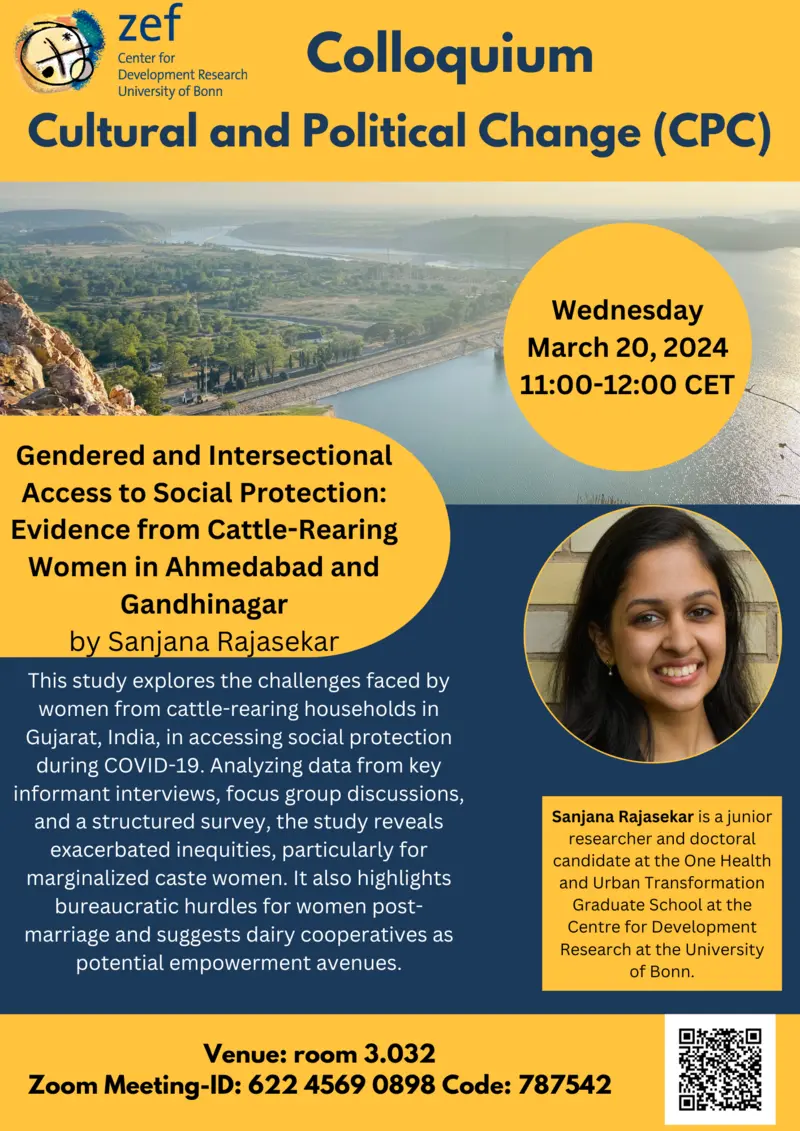ZEF colloquium on "Gendered and Intersectional Access to Social Protection: Evidence from Cattle-Rearing Women in Ahmedabad and Gandhinagar"
March 20, 2024 | 11:00 h - 12:00 h
The divsion of Cultural and Political Change (CPC) invites you to a ZEF colloquium!
Topic: Gendered and Intersectional Access to Social Protection: Evidence from Cattle-Rearing Women in Ahmedabad and Gandhinagar
Speaker: Sanjana Rajasekar, ZEF Junior Researcher at the One Health and Urban Transformation Graduate School.
You can join via Zoom: https://uni-bonn.zoom-x.de/j/62245690898?pwd=N3ZJVUFaYm40SjNYQy93YzlnRnpEQT09
Abstract
Access to social protection is essential in enhancing the resilience to food insecurity vulnerable households. This research investigates the experiences of women in cattle-rearing households in Gujarat, India, focusing on the intersectional challenges they faced in accessing social protection for food security during the COVID-19 pandemic. Qualitative data from 29 semi-structured interviews with community health workers, dairy cooperative heads, and local shop workers, five key informant interviews, and one focus group discussion with nine women from the Pethapur Mahila Dudh Mandali, along with quantitative data from a structured survey of 445 women from small-holder cattle-rearing households was analyzed. The findings suggest that due to social distancing regulations, WhatsApp groups became popular platforms to disseminate information. However, these groups systematically excluded illiterate women and women from marginalized castes, who often did not have access to mobile phones. Even in cases where information was disseminated door-to-door by community health workers, they excluded marginalized caste women, citing geographical barriers, thereby reproducing existing intersectional inequities. The study also explores the challenges faced by daughters-in-law. Post-marriage surname changes created bureaucratic barriers in accessing food security schemes, as their new identity often remains undocumented. Consequently, their inability to avail of food security schemes reduces the household's total food supply. This study also explores how dairy cooperatives, as collective organizations based on livelihood, can transcend societal divides and empower these women, particularly in their access to social protection.
Sanjana Rajasekar is a junior researcher and doctoral candidate at the One Health and Urban Transformation Graduate School at the Centre for Development Research at the University of Bonn. She holds a Bachelor of Economics from Azim Premji University and Master of Science in Development Economics from the University of Göttingen. She has worked on projects pertaining to food security, social protection, and livelihoods in various parts of India.



